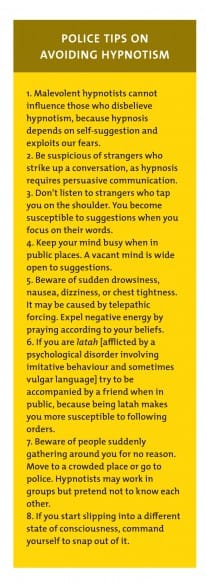Hypnotism – when defined as the act of putting someone into a trance and under your control – is not real. But in Indonesia, many scam victims insist they were hypnotized, as if they were powerless to prevent themselves from being swindled.
I was conned once. It was back in 1994, when I was a tourist in London. Sitting by Westminster Bridge, I was approached by an immaculately dressed, well-spoken stranger. He claimed to be a professional golfer, who had left his wallet in the back of a taxi and needed to borrow 100 pounds to get to a tournament. He promised to repay the money. Being youthfully naive, I gave him the money. I never saw him again.
It was a costly lesson in scepticism. I certainly wasn’t hypnotised. I had merely been duped by a conman’s persuasive patter.
So, what is hypnotism? According to Greek mythology, Hypnos was the god of sleep, who lived in a cave surrounded by opium poppies and other narcotic vegetation. Then in 1842, a Scottish surgeon named James Braid coined the term ‘hypnotism’ to describe the process by which people could be put into a trance-like state induced by visual and mental focus on a single object.
The official dictionary of Indonesia, Kamus Besar Bahasa Indonesia, goes further. It defines hypnosis as “a sleep-like state induced by suggestion, putting a person under the influence of the individual who gives the suggestion, after which the subject becomes completely unaware”. Nonsense.
Yes, a person can be relaxed to the point of daydreaming, where they go along with someone’s suggestions, but they retain a level of awareness and cannot be forced to do something against their will. You can only be hypnotised if you want to be – unless perhaps you have been beaten, shocked or drugged.
Movies and TV shows have convinced many people that a swinging pendulum or mesmerizing gestures and words can cause a person to fall into trance and then follow orders. There are also stage shows, where performers command willing subjects to engage in buffoonery.
What about hypnosis therapy, where people pay money in the hope of quitting smoking, losing weight or growing bigger breasts or a longer penis? Paying someone to help you achieve positive thinking and self-discipline may have benefits, such as alleviating symptoms, pain, stress and anxiety, but it won’t cure diseases or reverse baldness. At worst, some hypnotherapists plant dangerous ideas in people’s minds and foster self-delusion.
Indonesia’s most famous magician, Deddy Corbuzier, sometimes performs hypnotism on TV shows. He once pretended he could make viewers sitting at home be unable to stand up – and even asked them to Tweet photos of their subsequent immobility. But first, he carefully explained that people who did not wish to participate should lift their feet off the floor. I was willing. I focused intently on his instructions, planting my feet firmly on the floor, palms pressing down on my thighs. Alas, when Deddy commanded “Try to stand up,” I stood up.
Another TV hypnotist, Uya Kuya, finds attention-seeking celebrities, such as big-chested actress Julia Perez, who are willing to go along with cringingly lowbrow antics, like scratching their heads when they hear trigger words. Such clowning may seem harmless, but it’s dangerous when it makes people believe hypnotism is real.
TV shows featuring hypnotists should be prefaced and concluded with announcements that hypnotism is phony. Otherwise, people will think there really are ‘mentalists’ who can control them for nefarious purposes.
The Indonesian media invariably supports the myth that scam victims were hypnotised. The Riau Pos reported on January 28 that a man carrying Rp.40 million to pay for his upcoming wedding party was resting at a small mosque when a stranger hypnotised him and persuaded him to part with his cash.
In another case, Iskandar (34) from Aceh province was robbed in late January while taking a bus to the North Sumatra capital of Medan, where he had intended to purchase a bicycle. Four well-dressed men boarded the bus, introduced themselves as healers and gave Iskandar a massage. Arriving at his destination, he noticed his roll of banknotes, amounting to Rp.8 million, had been removed from his pocket. He told police he was hypnotised.
Also in Medan, university student Isra Purnama (23) was robbed last month while on her way home after a lecture. A motorcyclist asked her for directions to a doctor’s clinic on the pretext that his mother was unwell. He convinced her to get on his motorbike and hand over her bag for safekeeping up front. After driving a short distance, he dropped a piece of paper containing the doctor’s address and quickly stopped the bike. Isra dismounted to pick up the paper and the man sped away, taking her bag of valuables. Naturally, she declared she had been hypnotised.
People also claim to be hypnotised via phone calls from scammers, whether it be buying them telephone credit or transferring funds for bogus investments or job offers. Police in West Kalimantan on January 24 arrested five men for fraud involving hypnotism, which had netted them Rp.660 million – peanuts compared to the vast sums squandered by legislators on comparative studies abroad.

Allegations of hypnotism have even been made by Jessica Wongso, who is suspected of murdering her friend Mirna Salihin on January 6 by putting cyanide in her coffee. After Jessica was interrogated by police, she complained to the National Commission on Human Rights that she had been hypnotised. And when people recently joined a cult called Fajar Nusantara Movement (Gafatar) that combines teachings of Islam, Christianity and Judaism, the Indonesian Ulema Council declared that Gafatar’s adherents had been controlled by satanic hypnosis.
And so it goes on. Police in 2007 issued eight guidelines on how to avoid being hypnotised. Reproduced here in English and slightly abridged, they’re mostly sensible, except the bit about “telepathic forcing”. Remember, you can’t be hypnotised, but you can be scammed if you don’t practise scepticism.





